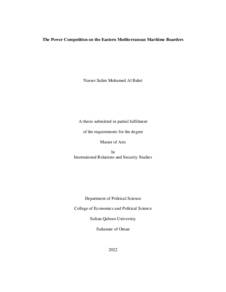وثيقة
The Power competition on the Eastern Mediterranean maritime boarders.
الناشر
Sultan Qaboos University.
ميلادي
2022
اللغة
الأنجليزية
الملخص الإنجليزي
The Eastern Mediterranean has become one of the world's hottest conflict zones with longstanding
historical claims. The Mediterranean Sea importance comes from its strategic position for
international trade communication. With many states having direct access to the Mediterranean
Sea, peace is essential for the area's future prosperity. August 2020 witnessed an escalation
between the Eastern European nations of Turkey, Greece, and Cyprus over natural gas exploration
in the Mediterranean Sea. Previous research has shown that most maritime conflicts are resolved
via negotiation, litigation, or arbitration. However, this is not the case with the Mediterranean Sea
disputes. While most maritime territorial disputes remain dormant and rise to the surface only
when states compete for resources, this dispute has no exception. The August 2020 crisis is an on going crisis which surfaced a decade ago when the United States Geological Survey (USGS)
discovered a massive amount of natural gas deposits in the Mediterranean Sea. Although
discovering mineral resources could take the region into a new era of cooperation, it was otherwise
as competition fired by old antagonism started to appear between the Mediterranean countries on
one side and Turkey on the other side. This research analyzed the Turkish role in August 2020
using the Realism theory via a qualitative research methodology. Data were collected using
documents and interviews. The significance of this research lies in providing a new understanding
of the crisis by studying the changes in regional powers and domestic power components (Political
and economic) and reflecting their influence on the Turkish Foreign Policy. The research shows
that the crisis arose due to the emergence of Turkey as a regional power accompanied with a
decline in other powers such as the USA, in addition to the deterioration of relations between
Turkey with Greece, Cyprus, Egypt, and Israel, which pushed these states towards collaboration
to isolate Turkey. That collaboration was represented in the Eastern Mediterranean Gas Forum that
excluded Turkey's membership and trilateral partnerships between these states. In addition, with
the growing perception of isolation following the EastMed gas pipeline project that undermined
the Turkish plans to become an energy hub. Due to and the domestic power components (political
and economic) within Turkey, the Turkish leadership's had a perception that Turkey's interests -
being the biggest economy, largest regional navy, owner of the longest coasts- must always be
considered in any future projects in the area. Therefore, the study showed that the crisis soared due
to the assertive Turkish efforts to protect its maritime claims against Greece, Cyprus, Egypt, and
Israel.
المجموعة
URL المصدر
الملخص العربي
شهد الربع الثالث لعام 2020م تصاعدا كبيرا للخلافات والمنافسة بين دول حوض شرق البحر الأبيض المتوسط حول قضية التنقيب عن النفط والذي بدأت بوادره تلوح في الأفق بعدما أعلنت هيئة المسح الجيولوجي الأمريكية بأن الحوض يضم مخزونا استراتيجيا من الغاز الطبيعي.
قالب العنصر
الرسائل والأطروحات الجامعية

